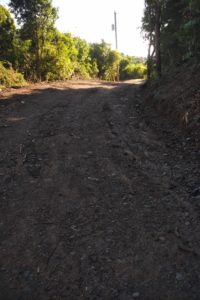
Neighbors of St. Croix landowner Bernard Cuffy are challenging a Superior Court decision that allowed Cuffy to construct a road on a shared right of way. Cuffy, they say, lied under oath and to the community at large when he took his case to the media.
After Cuffy bought land in Estate Clairmont two years ago, he began clearing a pathway with the intent of developing a road that would lead to his property. But neighbors who also shared the pathway said Cuffy was invading their private property and infringing on their rights. A two-day trial in V.I. Superior Court ensued on July 1 and July 2, and Judge Jomo Meade ruled in Cuffy’s favor on July 2.
Three of the plaintiffs in that case filed notice of appeal to the Supreme Court of the Virgin Islands on July 30, according to a submitted document. The plaintiffs include Brian Devlin and Cynthia Devlin who are tenants in the home of the third plaintiff, Patricia Babij. With their notice of appeal, they hope to prove that the Superior Court’s ruling was a mistake.
Was Racism a Factor?
Before the Superior Court trial began, the matter was taken to the court of public opinion in June when Cuffy told one media source that his white neighbors were trying to block him from accessing his property. Cuffy is captured on video saying that one of the neighbors asked why he didn’t go “back to where he came from” during one of their exchanges. In a phone interview on Tuesday, Cuffy told the Source that he stood by that comment.
After the media reports in June, there was immediate outrage from the predominantly black Virgin Islands public. Many took to social media to express their anger and share personal experiences of racism.
Until now, the plaintiffs and their previous attorney Mark Eckard have remained silent. Monday, they released a prepared statement via the new attorney for their appeal, Yohana Manning.
In the statement, Manning called Cuffy the “Jussie Smollett of the Virgin Islands.” In comparing Cuffy to Smollet, who was charged with falsely reporting a racist and homophobic attack, Manning said that Cuffy “defrauded the entirety of the Virgin Islands for his personal benefit through a series of lies.” Cuffy’s statements have resulted in multiple death threats towards his clients, Manning said during a phone interview on Monday.
Manning also claimed that no one ever told Cuffy to go back to where he came from.
“The fact is, no such statement was ever uttered, nor in any case would such a statement ever be made by any of the neighbors,” he said in the statement.
According to Manning, there were both black and white neighbors who were concerned with Cuffy’s actions.
“The fact is that all the neighbors, both black and white, were attempting to find a solution that would meet the needs of the entire neighborhood, not only Mr. Cuffy, before he began showing up with bulldozers,” Manning said.
Austin McKenzie, the only black plaintiff, was the only one to testify on the plaintiffs’ behalf during the Superior Court trial. Manning, a black lawyer, will be handling the appeal. Asked if he thought that both he and McKenzie were being used as pawns to prove that the other neighbors weren’t racist, Manning said he couldn’t comment on what happened at the Superior Court since he wasn’t there. But as for whether he himself was being used, his response was “absolutely not, because I believe in my clients’ cause.”
“I cannot be used,” he said over the phone. “I’ve fought too many cases, and I know the law too well to sit up here and be used by a client…. This case has absolutely nothing to do with race.”
Before the Superior Court trial, a temporary restraining order had been placed on Cuffy, preventing him from working on the disputed access. According to Manning, Cuffy then played on “racial tensions” in the community to “change the narrative” of the land access disagreement in order to get his own way.
In court, Cuffy did not bring up race. However, his lawyer Gertrude LeCointe argued that the land access dispute was one rooted in malice and fraud. Cuffy testified that the plaintiffs tried to convince him and his wife to sign a document waiving their rights to the shared pathway.
The Devlins, via Manning’s statement, have also denied that a document was ever drafted or presented for signature.
“He falsely testified under oath that a document was presented to him and his wife, suggesting he was being coerced to sign away his rights to the abandoned right of way,” Manning said in the statement.
When asked for a copy of the contract he was asked to sign, Cuffy said he didn’t have one. Cuffy told the Source on Tuesday that the document was never printed because he and his wife were not interested, but it was shown to them via one of the plaintiffs’ laptops.
Suggestion of an Alternate Route

Prior to their court battle, neighbors had suggested that Cuffy use an alternate route to access his property. On Monday, Manning maintained that this was a viable solution to the dispute.
“There is access to this property if he just goes around the front like everybody else, like the last landowners’ did…. It’s a nice, flat, smooth road,” Manning said over the phone. “I don’t see why this is such a big deal.”
He said that Cuffy has two alternate routes to access his property.
But Cuffy said that the Devlins are trying to manipulate him in a way that he believes they’ve manipulated the only other black plaintiff, McKenzie. According to Cuffy, the Devlins convinced McKenzie to use a road that was “substandard” to the right-of-way. Cuffy said that the road McKenzie now uses to access his property goes through the Devlins’ entrance and that was one of the options they’d proposed to him as well.
“What they wanted to do is: do me like they did McKenzie,” Cuffy said Tuesday. “They used him because they knew his deficiency. The man did not even know, in court, what an encroachment is. He had no idea that they had built a septic on the road …. The one thing I can never do is to be at the mercy of these people.”
In court, Wayne Callwood, a territorial public surveyor, gave testimony that landowners weren’t allowed to build private property beyond a 15-foot setback. He said the right of way would take precedence over any private property or other units that had been placed on it.
Norman Smith, the man Cuffy had hired to determine whether excavation and road clearing was feasible for the right-of-way, testified that he met two separate meter bases, a septic tank, steps, and a fence obstructing the designated right of way during his site visit. Smith also said that he saw trees, which plaintiffs had identified as mahogany, but which he said were not mahogany trees. At the entrance of the roadway, he also saw three boulders, he said.
LeCointe argued that the reason the plaintiffs had brought her client to court was because they were using the right-of-way like a backyard. She argued that they didn’t have the right to do so.
But according to Manning, some of the units placed on the pathway predate his clients. He said the Devlins have lived in the Babij house for more than 15 years, but the mahogany trees and the septic tank go back to 50 years or more.
In response during Tuesday’s phone interview, Cuffy said that wasn’t true. He said that either the homeowners, the Babijs, or the tenants, the Devlins, added an extension to the house to include a pool.
“When they did the extension on the house, they had no place to put the septic, and they put it on the road,” Cuffy said Tuesday.
Manning said that no one had objected to the trees or the septic tank in 50 years. He also said that cutting down the trees would depreciate the value of the properties in the area.
During a phone interview Wednesday, McKenzie said that he, Cuffy, and Brian Devlin had walked on alternate routes together. He described these routes as overgrown with bushes. They were undriveable and would require land clearing just like the right-of-way did, according to McKenzie. Asked why he and other neighbors were opposed to clearing the right-of-way, McKenzie said that the reason residents and property owners in the area advised Cuffy to use an alternate route was because they’d made a collective decision to keep the right-of-way closed prior to Cuffy’s arrival.
But Cuffy insisted on using the right-of-way, he said.
McKenzie also said he believed that Cuffy used race as a strategy to win the Superior Court case over the disputed pathway. He said his personal relationships with the Devlins in particular give him no doubt that they are not racist.
“That’s the card he used to win his case,” he said. “They are not racist. They are not. I don’t know why he say that.”
As for claims that he is using the Devlins’ entrance to access his own home and that he had been manipulated, McKenzie said neither is true.
According to McKenzie, the access that he currently uses was property previously owned by the Devlins but is his property now. He said the routes that were recommended to Cuffy are completely different.
In response to comments that he had been manipulated either in or out of court, McKenzie said, “not a thing go so.”
“That was my choice,” he said.
It’s also been his choice to not participate in the appeal process. He said he isn’t interested in prolonging the conflict and is tired of having his name “caught up” in the entire situation.
“We took it to court; he win the case, and the judge say, ‘Well, let him open up the road.’ And that’s why I stepped away from it,” McKenzie said. “I say I’m not going to fight and argue. I don’t have the patience and the time to go through all of that anymore.”

Suggestion of Land Purchase
As another potential solution to their conflict, the plaintiffs had also offered to buy Cuffy’s land in Clairmont.
In response, Cuffy said, “make me an offer I can’t refuse,” according to Manning.
On Tuesday, Cuffy confirmed that he did say this. He said that the offers started at $44,000 and went up to $65,000. However, he did not want to say on record how much he originally purchased the lot for.
During Monday’s phone interview, Manning called Cuffy “greedy.” He said that Cuffy originally purchased the lot for $6,400 but wanted much more.
“He paid $6,400 for the land, and he wanted some astronomical multiple,” Manning said. “And that’s what this case is about. This is about greed. This is the oldest sin known to man, and that’s greed. He’s a very greedy person.”
Cuffy said that what he originally paid for the lot isn’t the plaintiffs’ concern. He said he knew what the property was worth, considering that other properties in the same area went for $99,000 back in the 1980s.
“I was not willing to take that [the offer] because I knew what the property was worth,” he said. “What I paid for it has nothing to do with them.”
Relationships After Trial
Following his trial win, Cuffy continued work on the right-of-way and submitted pictures showing progress of the land clearing.
During Tuesday’s phone interview, he said there was still more to do since the septic’s drain fill takes up 15 feet of the 30-foot wide road. He said there were other units, including a concrete pedestal, fence, and steps, that reached anywhere between 8 and 12 feet into the right-of-way.
Cuffy said that throughout the land clearing process, his neighbors have tried to “make conversation” but he wasn’t interested in talking with them.
“I know that we need to get to the point where they have to remove their items, but I think I’m just gonna have an attorney address them because I’m just not in the frame of mind because they put me through too much,” he said.
Sometimes conversations would include questions like, “How long is this going to be for? How far are you going today?” according to Cuffy.
“I just don’t answer,” he said.
His wife, Athlene Cuffy, said her husband is putting the situation mildly.
“Within clearing that road, Mr. Devlin has been an absolute menace,” she said. “He’s been an absolute menace.”
According to Athlene Cuffy, Brian Devlin did all he could to “interrupt the process.”
She expressed frustration over the entire dispute.
“I would just like this whole thing to be over – buried and over – and I can move on with my life in peace.”
The Source reached out to the Devlins for direct comment, but they deferred to Manning.
In a follow-up call on Wednesday, Manning said he advised them not to give comment because they’d “been through enough,” including death threats and having their words taken out of context.
He said that his clients were outstanding members of the community who had made St. Croix their home for the past 15 years. One of their major accomplishments, according to Manning, is a veterans’ memorial in commemoration of St. Croix’s military service men and women.
The lawyer said that he loves his clients and was proud of them for fighting “to get the truth out.”
“I’m so proud of my clients. And they love this Virgin Islands. This is home to them,” he said. “People are saying that ‘Look! We should put a bullet through them’ … all on a rumor. They said ‘No. This isn’t truth. And we’re going to fight to get the truth out.’”
The Appeal
Manning said he believes his clients have a strong case and called Cuffy’s triumph “premature.”
Cuffy has received a land clearing permit from DPNR, and during the trial, at least one DPNR representative testified that the permit allowed land grading and road construction.
But Manning said that his clients, in their appeal, are claiming that the trial judge denied them due process of law via an administrative appeal to the Bureau of Land Use Appeals regarding the permit issued.
The appeal in entirety seeks to address the following:
— whether the Superior Court made a mistake in denying the plaintiffs’ request to stop Cuffy from clearing the right-of-way,
— whether the Superior Court made a mistake in concluding that the plaintiffs failed to prove Cuffy had trespassed on their property,
— whether the Superior Court used the correct standard of review when ruling,
— whether the Superior Court made a mistake in dismissing the plaintiffs’ claims,
— whether the Superior Court should have allowed the plaintiffs to make an administrative appeal before the Board of Land Use Appeals,
— and whether the Superior Court had the authority to make a ruling before allowing the completion of the Board of Land Use Appeals.
If they are successful in making their case, the Superior Court decision will be reversed.
According to Manning, it would be the right decision even if it weren’t a decision welcomed by the public.
“This may not be the most popular position out there, but it’s the right position,” he said. “Truth that’s in the murkiest of waters – no matter what you do to it – it will always come to the top. And what Mr. Cuffy is trying to do is to fight to suppress the truth.”
Manning also said he was hoping for the opportunity to question Bernard Cuffy in court.
“I’m looking forward to the day that I can get him on the witness stand. Once I do that, I’m going to prove that he lied because he’s a liar,” he said.
After reading Manning’s written statement in another news publication, Cuffy cited an English nursery rhyme, which says “Little Tommy Tucker sings for his supper. What shall we give him?”
Asked what it meant, Cuffy responded via text message on Tuesday, “it’s an English nursery rhyme we repeated when people without integrity do anything for money. In other words, the lawyer is just singing for his supper.”





